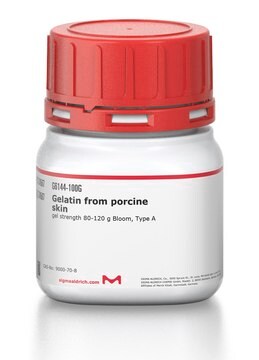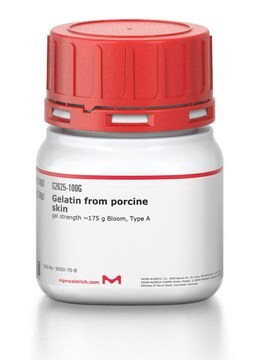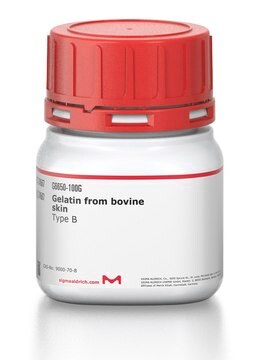G1890
Porcine Gelatin
from porcine skin, Type A, powder, gel strength ~300 g Bloom, suitable for electrophoresis and cell culture
About This Item
Recommended Products
product name
Gelatin from porcine skin, powder, gel strength ~300 g Bloom, Type A, BioReagent, suitable for electrophoresis, suitable for cell culture
biological source
Porcine skin
Quality Level
sterility
sterile
type
Type A
product line
BioReagent
form
powder
mol wt
50—100 kDa
packaging
pkg of 1 kg
pkg of 100 g
pkg of 500 g
concentration
70—90% Biuret
technique(s)
cell culture | mammalian: suitable
electrophoresis: suitable
surface coverage
100‑200 μg/cm2
solubility
H2O: soluble 50 mg/mL, clear to hazy, faintly yellow
shipped in
ambient
storage temp.
room temp
Looking for similar products? Visit Product Comparison Guide
General description
Application
Features and Benefits
- Sterile gelatin sourced from porcine skin.
- Free from proteases.
- In the form of gelatin powder for convenient and easy handling.
- Versatile for use in cell culture and electrophoresis techniques.
- Provides adequate surface coverage for various applications.
Components
Caution
Preparation Note
Storage Class Code
11 - Combustible Solids
WGK
nwg
Flash Point(F)
Not applicable
Flash Point(C)
Not applicable
Personal Protective Equipment
Certificates of Analysis (COA)
Search for Certificates of Analysis (COA) by entering the products Lot/Batch Number. Lot and Batch Numbers can be found on a product’s label following the words ‘Lot’ or ‘Batch’.
Already Own This Product?
Find documentation for the products that you have recently purchased in the Document Library.
Customers Also Viewed
Articles
Discussion of synthetic modifications to gelatin, improving the three-dimensional (3D) print resolution, and resulting material properties.
Attachment Factors for 3-Dimensional Cell Culture
The extracellular matrix (ECM) is secreted by cells and surrounds them in tissues.
We will explore the technological advances that have contributed toward the progress of 3DP of tissue engineering scaffolds, current materials used to create 3DP scaffolds, and the challenges that remain.
Our team of scientists has experience in all areas of research including Life Science, Material Science, Chemical Synthesis, Chromatography, Analytical and many others.
Contact Technical Service














